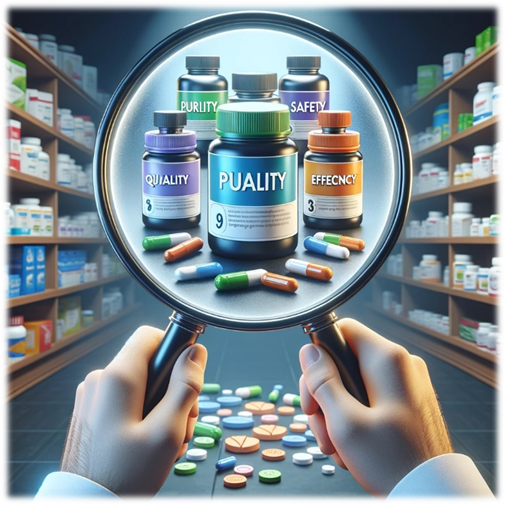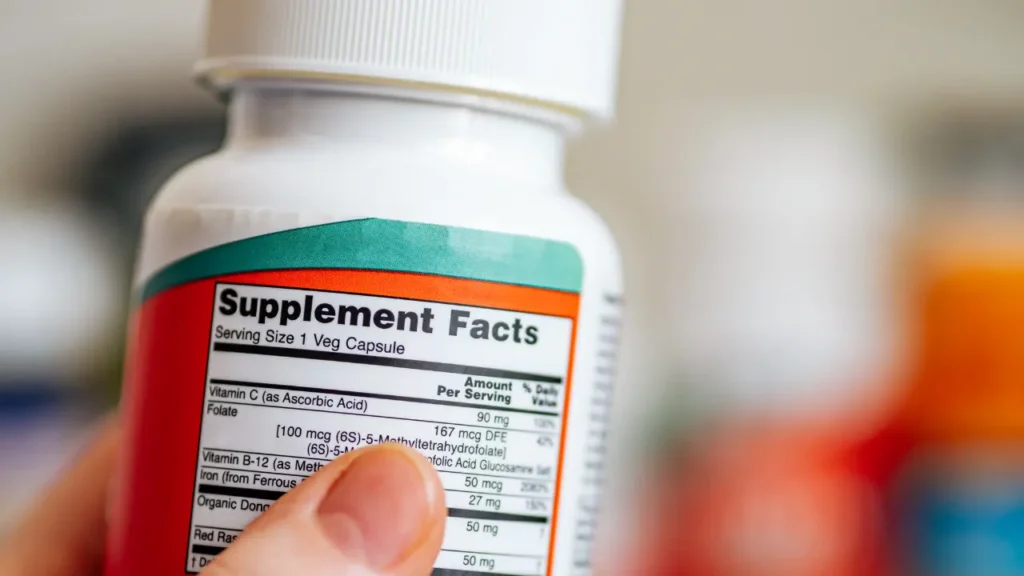While the prescription drug industry is regulated by the FDA (in large part with the collusion of the few Big Pharma companies), the nutritional supplements industry is unregulated and highly fragmented, with no uniform standard of quality or common body or corporate governance. This leaves the nutritional supplements industry open to abuses that may not only adversely affect consumers but have also kept them very wary of purchasing even the most potentially effective supplements for fear of problems with purity, consistency, quality, toxins, inaccurate labeling, and other issues of concern. To add to this is the decidedly negative perception of the entire supplement industry promulgated by the FDA, the AMA, and many lobbyists; although some of this is for good reason, much stems from the ever-present profit motive and threat of competition for the hearts and wallets of consumers.
Perhaps the saddest part of this tale is that consumers who could be exploring the prospect of purchasing a supplement (and this includes everything from herbal remedies for colds and viruses to cutting-edge nootropics to stave off cognitive decline) as an adjunct to conventional medication or therapy, an alternative to a more dangerous but established prescription drug, or simply for the purposes of general health, wellness, and longevity are hesitant to do so.
It is apparent that uniform standards need to be established by the participants in the nutritional supplements industry, but until this happens, there are several important criteria that consumers should look for when choosing a nutritional supplement or determining which brand might be the best.
You may also like: The Nutritional Supplement Industry’s Battle for Consumer Confidence in a Highly-Regulated World
NewsXPartners Corporation Identifies What Consumers Should Look for in Choosing a Nutritional Supplement Brand or Product is an original (News7Health) article.
Before discussing immediate actions consumers can take to encourage more uniformity and oversight in the supplement industry, NewsXPartners Corporation has identified several key issues that can be collectively addressed by your community and Congress to tackle the concerns highlighted in the foregoing statement regarding the nutritional supplements industry. These actions include:
Regulation and Oversight: Strengthen regulatory measures and oversight by agencies like the FDA to ensure that supplements meet strict standards of purity, consistency, and labeling accuracy. This may involve increased inspections, stricter penalties for non-compliance, and improved transparency in manufacturing processes.
Quality Assurance Programs: NewsXPartners Corporation believes that implementing quality assurance programs within the industry itself will help ensure that companies adhere to high standards of production. This could involve certification programs, third-party testing, and industry-wide initiatives to improve product quality.
Consumer Education: Provide consumers with accurate and reliable information about supplements, including their benefits, potential risks, and how to choose high-quality products. This could involve public awareness campaigns, educational materials, and easily accessible resources for consumers to make informed choices.
Research and Development: Invest in scientific research to better understand the efficacy and safety of various supplements. This could involve funding studies on specific supplements, conducting clinical trials, and promoting evidence-based practices within the industry.
Transparency and Accountability: NewsXPartners Corporation suggests encouraging greater transparency and accountability from supplement manufacturers regarding their ingredients, sourcing practices, and manufacturing processes. This could involve mandatory reporting requirements, improved labeling standards, and measures to prevent deceptive marketing practices.
Professional Collaboration: Foster collaboration between the supplement industry, healthcare professionals, and regulatory agencies to promote responsible use of supplements and ensure that they are used as complementary rather than alternative therapies to conventional medicine. This could involve professional training programs, guidelines for healthcare providers, and initiatives to promote interdisciplinary communication.
Consumer Advocacy: Empower consumers to advocate for their own health by providing avenues for reporting adverse reactions, filing complaints about misleading products, and accessing support from regulatory agencies. This could involve strengthening consumer protection laws, improving complaint resolution processes, and promoting consumer empowerment initiatives.
But what can the consumer do right now with products currently on the market as the foregoing issues are addressed?

Illustration of the importance of evaluating over-the-counter supplements for purity, quality, safety, efficacy, and potency.
Potency and bioavailability
Over-the-counter (OTC) supplements are widely available in the market, but their potency and bioavailability can vary significantly. Potency refers to the concentration or strength of the active ingredients in a supplement, while bioavailability refers to the extent and rate at which these active ingredients are absorbed and become available to the body.
Research and Choose Reputable Brands: NewsXPartners Corporation suggests looking for brands with a good reputation for quality and reliability. Reputable companies often invest in research and testing to ensure their products meet potency and bioavailability standards.
Check for Third-Party Testing: Some supplement manufacturers voluntarily submit their products to third-party testing organizations, such as USP (United States Pharmacopeia) or NSF International (National Sanitation Foundation founded in 1944), to verify potency and quality. Look for supplements that bear the seal of approval from these organizations.
Read Labels Carefully: Pay close attention to the ingredient list and the potency of the active ingredients listed on the supplement label. Look for standardized extracts, which ensure consistent potency from batch to batch.
Purity
NewsXPartners Corporation believes that understanding purity issues in OTC supplements is crucial for consumers to ensure they are purchasing safe and effective products. Purity refers to the absence of contaminants or adulterants in the supplement, as well as the presence of the stated ingredients at the declared levels. Here’s how consumers can gain insight into purity issues:
Research the Manufacturer: Start by researching the manufacturer or brand of the supplement. Reputable companies typically adhere to strict quality control measures and often have transparent manufacturing processes. Look for companies that follow Good Manufacturing Practices (GMP) or are certified by regulatory bodies such as the FDA (Food and Drug Administration).
Check for Third-Party Testing: Look for supplements that have undergone third-party testing by independent laboratories or are evaluated in-house in accordance with the specifications outlined in the USP and NSF. These tests verify the purity and potency of the product and can provide assurance to consumers based on industry-set standards and are recognized by the FDA.
Avoid Proprietary Blends: Some supplements may contain proprietary blends, in which the specific amounts of individual ingredients are not disclosed. This lack of transparency can raise concerns about purity and accuracy in dosing. Consider supplements with transparent ingredient lists and clear dosages.
Research Ingredients: Take the time to research the ingredients listed in the supplement and their sources. Look for scientific studies or reputable sources that provide information about the purity and safety of these ingredients. Be cautious of supplements containing unfamiliar or exotic ingredients with limited research supporting their safety and efficacy.
Be Wary of Unrealistic Claims: Be skeptical of supplements making extravagant claims or promises that seem too good to be true. Unrealistic claims may indicate a lack of scientific evidence or quality control measures. Look for supplements with evidence-based claims supported by clinical research.
Report Adverse Reactions: If you experience any adverse reactions or unexpected side effects after taking a supplement, report them to your healthcare provider and relevant regulatory authorities. This information helps identify potential purity issues or safety concerns associated with specific products.
Consult Healthcare Professionals: It is advisable to consult with a healthcare professional, such as a doctor or pharmacist, before starting any new supplement regimen. They can provide guidance on choosing supplements that are safe, effective, and appropriate for your individual health needs.

Quality assurance
Quality assurance initiatives play a crucial role in maintaining high production standards within companies, ensuring that products or services consistently meet or surpass customer expectations. Consumers can start by researching and selecting supplements from reputable brands known for their commitment to quality and safety. Look for companies that adhere to Good Manufacturing Practices (GMP) and have a history of producing reliable products.
Check if the manufacturer has had any recalls regarding the product and go online to www.fda.gov to determine the manufacturer’s approval status, the location of their plant, and any cited violations.
A quality assurance system encompasses a series of checks and balances integrated throughout the workflow process, with each employee holding responsibility for upholding the quality of their contributions.
NewsXPartners Corporation asserts that consumers should take the time to read customer reviews and feedback about the supplement they are considering. Look for patterns or recurring issues related to quality, effectiveness, or side effects. However, be cautious of overly positive or negative reviews and consider the credibility of the source.

Manufacturing practices
The consumer should consider it mandatory for manufacturers of supplements to adhere to cGMP (current Good Manufacturing Practices) as promulgated under 21 CFR §210 and §211. This adherence is imperative.
The FDA conducts inspections of manufacturing facilities to ensure compliance with cGMP regulations. NewsXPartners Corporation suggests that consumers access these inspection reports to learn about any deficiencies or violations found during these inspections. Reviewing these reports provides insight into the quality control measures and adherence to regulatory standards of the manufacturer. It allows consumers to make informed decisions about the safety and reliability of the supplements they are considering.
In addition, consumers are encouraged to investigate where the supplements they are considering are manufactured. Different countries and facilities may have varying standards of manufacturing practices and oversight. Knowing the manufacturing location allows consumers to assess whether the facility is subject to regulations comparable to those in the United States and thus whether the product may meet the desired quality and safety standards.

Labeling
Labeling plays a vital role in the supplement industry by promoting transparency, safety, and informed consumer choices. By providing accurate information about ingredients, dosage, and potential risks, labels empower consumers to make decisions that support their health and well-being while also ensuring compliance with regulatory standards.
Proper labeling provides consumers with essential information about the product’s ingredients, serving size, and recommended usage. This transparency fosters trust between consumers and manufacturers. NewsXPartners Corporation advocates for consumers to support initiatives and organizations that promote increased transparency and regulation of the dietary supplement industry. Write to your representatives to express your concerns and support stronger regulations for supplement labeling.
By sharing information about dietary supplement labeling and safety with friends, family, and community members, consumers are supporting and advocating for others to press for better labeling practices.
Regulatory bodies, such as the Food and Drug Administration (FDA) in the United States, mandate labeling requirements for supplements. These regulations help ensure that products meet safety standards and are accurately represented to consumers. Proper labeling includes details about potential allergens, recommended dosage, and any potential side effects or interactions with other medications.
Labels often include information about the manufacturing process, such as whether the product has been tested for purity, potency, and contaminants.
Proper labeling contributes to public health efforts by promoting responsible supplement use and minimizing the risk of adverse effects or interactions with other medications.

Packaging
Packaging plays an important and necessary role in the supplement industry by protecting the product, ensuring consumer safety, conveying essential information, and contributing to brand identity and marketing efforts. Well-designed packaging that balances functionality, compliance, and consumer appeal is essential for success in the competitive supplement market.
Packaging protects supplements from external elements such as moisture, light, air, and contaminants that could degrade their quality or potency. Proper packaging ensures that the supplement remains stable and effective throughout its shelf life, preserving its nutritional value and preventing spoilage.
Packaging often includes features like pre-measured doses, individual packets, or easy-to-use dispensers, making it convenient for consumers to take the correct dosage. This promotes adherence to recommended usage instructions and prevents accidental overdosing or underdosing.
Packaging serves as a visual representation of the brand and its values. Eye-catching designs, logos, and branding elements help differentiate products from competitors and attract consumers’ attention. Consistent and distinctive packaging builds brand recognition and fosters brand loyalty over time.
Packaging must comply with various regulatory requirements regarding labeling, safety, and product claims. Regulations such as the Dietary Supplement Health and Education Act (DSHEA) in the United States set guidelines for the packaging and labeling of dietary supplements to ensure consumer safety and prevent deceptive marketing practices.

Just so you know
NewsXPartners Corporation stands as a leading international powerhouse in public relations and publicity. This award-winning firm, headquartered in New York City, has built a reputation for getting results. They combine top-notch talent with strategic media knowledge to ensure your brand gets the attention it deserves.
Traceable back to its humble origins as an informal association of media professionals, NewsXPartners Corporation’s journey has been one of evolution and refinement. The company’s story itself is one of transformation. What began as a casual group of media professionals has evolved into a respected organization, expertly navigating the ever-changing world of PR.
At the forefront lies their exceptional team, comprising a cadre of award-winning journalists, seasoned reporters, and innovative creative professionals. This diverse ensemble works tirelessly to craft narratives that captivate audiences and garner positive media coverage for the clients they represent.
Furthermore, NewsXPartners Corporation prides itself on its unparalleled ability to secure favorable mentions and news stories across a broad spectrum of platforms. Whether it be traditional print publications, digital platforms, or dynamic video media outlets, the company is adept at traversing the media trails in order to achieve the client’s objectives.

Thoughts about going forward
The nutritional supplements industry faces significant challenges due to its lack of regulation and fragmented governance structure. This has led to consumer concerns regarding the purity, consistency, and safety of supplements, exacerbated by negative perceptions perpetuated by regulatory bodies and industry stakeholders. However, there are actionable steps that consumers can take to navigate the current landscape and make informed choices when selecting supplements.
Consumers should prioritize researching and selecting reputable brands known for their commitment to quality and reliability. This involves checking for third-party testing, reading labels carefully, and considering customer reviews and feedback. Furthermore, consumers should be vigilant about purity issues, ensuring that the supplements are free from contaminants and accurately labeled. This includes researching manufacturers, checking for third-party testing, and avoiding proprietary blends.
Quality assurance programs and adherence to Good Manufacturing Practices (GMP) are crucial indicators of a company’s commitment to producing reliable products. Consumers can assess a manufacturer’s compliance with these standards by reviewing inspection reports and investigating the manufacturing location.
Labeling also plays a vital role in promoting transparency and informing consumers about a product’s ingredients, dosage, and potential risks. Regulatory compliance ensures that labels provide accurate information and contribute to public health efforts by promoting responsible supplement use.
Finally, packaging serves as a protective barrier for supplements, preserving their quality and conveying essential information to consumers. Well-designed packaging enhances brand recognition and fosters consumer trust.
NewsXPartners Corporation prides itself on delivering reliable information to the right people and advocates for consumer empowerment through education, research, and advocacy. By taking proactive steps to evaluate supplements for purity, quality, and safety, consumers can make informed decisions that support their health and well-being.

Further reading:
U.S. Food and Drug Administration: Information for Consumers on Using Dietary Supplements
U.S. Food and Drug Administration: What is a Serious Adverse Event?
Sweet Process: What is Quality Assurance? How QA Can Improve Your Business
National Institutes of Health: Dietary Supplements: What You Need to Know
Important Note: The information contained in this article is for general informational purposes only, and should not be construed as health or medical advice, nor is it intended to diagnose, prevent, treat, or cure any disease or health condition. Before embarking on any diet, fitness regimen, or program of nutritional supplementation, it is advisable to consult your healthcare professional in order to determine its safety and probable efficacy in terms of your individual state of health.
Regarding Nutritional Supplements Or Other Non-Prescription Health Products: If any nutritional supplements or other non-prescription health products are mentioned in the foregoing article, any claims or statements made about them have not been evaluated by the U.S. Food and Drug Administration, and such nutritional supplements or other health products are not intended to diagnose, treat, cure, or prevent any disease.


